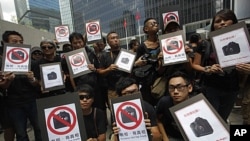Rights activists in Hong Kong have been highly critical of the local government following the recent visit of Chinese Vice-Premier Li Keqiang. They say curbs on the press and high security during the visit were a stark example of the increasing erosion of the civil rights enshrined in law when Hong Kong's sovereignty reverted from Britain to China in 1997.
Li's official visit two weeks ago was supposed to demonstrate Beijing's concern for the six million residents of this Special Administrative Region of China.
Instead of generating the intended goodwill, the presence of the man widely tipped to succeed Chinese Premier Wen Jiabao in 2012 has caused a public uproar, focusing attention on claims of police brutality and a clampdown on press freedoms.
Mak Yin-ting, chairwoman of the Hong Kong Journalists' Association, says that while repressive police tactics are common on the mainland, they are an emerging problem in Hong Kong.
"There was lots of harassment of press freedom as well as freedom of expression," Mak said. "And we are worried that it is not just individual cases - malpractice of frontline police - but it is a change of media policy."
Media were barred from more than one half of the 22 events Li attended. As a result, Mak says, the only source of news for much of the state visit was the sanitized output of the government information department.
Tiananmen arrest
Unlike in 2003, when Wen Jiabao mingled freely with the Hong Kong people, a series of restricted zones was created by the police, preventing media and the public from getting near the visiting dignitary.
At the Lam Tin housing estate, Li heard Hong Kong's middle-class complain about the government's inability to prioritize tackling social problems, particularly the growing wealth gap. Down the road, police arrested a man for wearing a T-shirt bearing a slogan supportive of the 1989 Tiananmen Square uprising.
818 incident
Police officers are also alleged to have assaulted and illegally detained three students at Hong Kong University August 18, locking them up in a stairwell while Li attended the school's centenary celebration.
The school is alma mater to many of Hong Kong's political and business leaders, and the students' treatment has prompted an alumni backlash.
Some 270 alumni from across the political spectrum took out a front page newspaper advertisement last week, denouncing the so-called 818 incident. Among them was former education secretary Fanny Law, now a deputy to the National People's Congress in Beijing.
"This storm tells us there is still a difference between the values held by Hong Kong and the beliefs of our central government," said Jasper Tsang, the pro-Beijing president of the Legislative Council.
One country
Hong Kong citizens are protective of the freedoms of speech and protest enshrined in the Basic Law, the constitutional document that perpetuates the "One Country, Two-Systems" mechanism by which Beijing governs the islands.
"In the mainland, many people cannot enjoy such freedoms. People say we are getting more and more like the mainland," noted Emily Lau, a pro-democracy legislator.
Lau was referencing two particular issues of recent concern to the public. First, a perceived increase in meddling in domestic politics by Beijing's senior official in Hong Kong, Wang Guangya.
Second, the Tsang administration's announcement that it would introduce national education into the schools' curriculum to stimulate patriotic thinking, a move dismissed as brainwashing by many teachers.
Beijing exonerated
On Monday, Secretary for Security Ambrose Lee was forced to declare in a special meeting of the Council's security committee that Beijing had not ordered the police crackdown.
Mak Yin-ting says efforts by Chief Executive Donald Tsang's administration to limit any political damage have only fueled criticism of his government.
"More and more, government officials dare not face the media or explain policies via the media to the public," Mak said. "More and more, they are using sources, closed-door briefings, to shy away from the public and, if necessary, shy away from responsibility."
Still, some officials are defending the government's actions. Chief Secretary Henry Tang - Tsang's number two and a contender to replace him next year, if Beijing approves - has dismissed the critics by calling allegations of civil rights violations "complete rubbish."
Hong Kong Rallies to Protect Freedoms After China VP's Goodwill Visit




